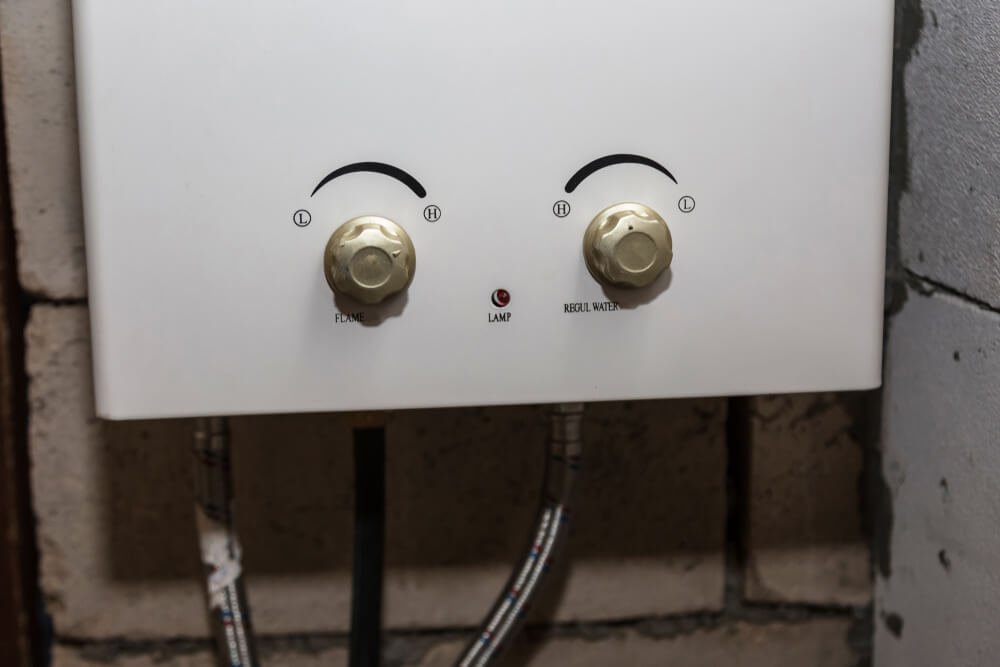
<h2>How Much Gas Does a Hot Water Heater Use?</h2>
<p>I had never given much thought to how much gas my hot water heater used until I got my first gas bill after moving into my new home. The amount seemed so high that I couldn't believe it. I called the gas company to verify that the bill was correct, and they assured me that it was.</p>
<p>I started to do some research to see if there was anything I could do to reduce my gas usage. That's when I learned that the amount of gas used by a hot water heater depends on a number of factors, including the size of the heater, the temperature of the water, and how often the heater is used.</p>
<h3>Factors That Affect Gas Usage</h3>
<p>The size of the hot water heater is one of the most important factors that affect gas usage. A larger heater will use more gas than a smaller heater. The temperature of the water also affects gas usage. The higher the temperature of the water, the more gas the heater will use to heat it.</p>
<p>The frequency of use also affects gas usage. A heater that is used frequently will use more gas than a heater that is used infrequently.</p>
<h3>How to Reduce Gas Usage</h3>
<p>There are a number of things you can do to reduce the amount of gas used by your hot water heater.</p>
<p><strong>Reduce the temperature of the water:</strong> One of the easiest ways to reduce your gas usage is to reduce the temperature of the water in your heater. Most water heaters are set to a temperature of 140 degrees Fahrenheit. You can reduce the temperature to 120 degrees Fahrenheit without sacrificing any comfort.</p>
<p><strong>Use less hot water:</strong> Another way to reduce your gas usage is to use less hot water. You can do this by taking shorter showers, washing clothes in cold water, and using a low-flow showerhead.</p>
<p><strong>Insulate your water heater:</strong> Insulating your water heater can also help to reduce gas usage. Insulation will help to keep the heat from escaping from the heater, which will make the heater more efficient.</p>
<p><strong>Replace your old water heater:</strong> If your water heater is old, it may be time to replace it. A new water heater will be more efficient than an old heater, which will save you money on gas.</p>
<h3>FAQ</h3>
<p><strong>Q: How much gas does a typical hot water heater use?</strong></p>
<p><strong>A:</strong> The amount of gas used by a hot water heater depends on a number of factors, including the size of the heater, the temperature of the water, and how often the heater is used. A typical gas water heater uses between 30,000 and 50,000 BTU per hour.</p>
<p><strong>Q: What is the most efficient way to heat water?</strong></p>
<p><strong>A:</strong> The most efficient way to heat water is to use a tankless water heater. Tankless water heaters heat water on demand, so they only use energy when you need hot water.</p>
<p><strong>Q: How can I tell if my water heater is efficient?</strong></p>
<p><strong>A:</strong> There are a few ways to tell if your water heater is efficient.</p>
<ol>
<li>Check the Energy Factor (EF) rating. The EF rating is a measure of the efficiency of a water heater. The higher the EF rating, the more efficient the water heater.</li>
<li>Look for the ENERGY STAR® label. The ENERGY STAR® label is a government-backed symbol of energy efficiency. Water heaters with the ENERGY STAR® label meet strict energy efficiency standards.</li>
<li>Compare the operating costs of different water heaters. The operating costs of a water heater are the amount of money it costs to operate the heater over a year. You can compare the operating costs of different water heaters by using the Department of Energy's water heater comparison tool.</li>
</ol>
<h3>Conclusion</h3>
<p>The amount of gas used by a hot water heater depends on a number of factors. By understanding these factors, you can take steps to reduce your gas usage and save money.</p>
<p><strong>Are you interested in learning more about water heaters?</strong></p>

Image: rivers-sebastian.blogspot.com

Image: www.residencestyle.com
How Much Does Water Heater Replacement Cost? – Anchor Plumbing An ENERGY STAR certified gas tankless water heater uses a secondary heat exchanger to use 9 percent less energy than a conventional gas tankless water heater. The secondary heat exchanger extracts more heat from the combustion gas, cooling it to the point where there is condensation – hence these types of heaters are called “gas condensing.”.